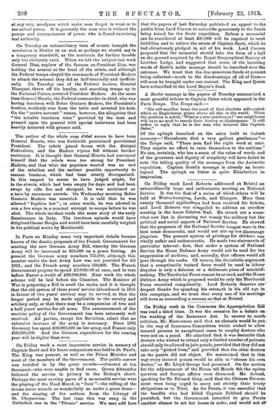On Friday week Lord Roberts addressed at Bristol an extraordinarily
large and enthusiastic meeting on National Service. It was the first of a series of which others will be held at Wolverhampton, Leeds, and Glasgow. More than- twenty thousand applications had been received for tickets, and Lord Roberts was cOvu_pelled to address an overflow meeting in the lesser Colston Hall. He struck out a some- what new line in discussing not merely the military but the and social aspects of National Service. He showed that the proposals of the National Service League were in the best sense democratic, and would not stir up but discourage jingoism. The present system of privilege for shirkera was wholly unfair and undemocratic. He made two statements of particular interest : first, that under a system of National Service the Home Defence Army would not be used for the suppression of strikers; and, secondly, that officers would all pass through the ranks. Of course, the Socialistic argument that a compulsorily trained force would be used in labour disputes is only a delusion or a deliberate piece of mischief- making. The Territorial Force cannot be so used, and the Home • Defence Army which is proposed would be only the Territorial Force recruited compulsorily. Lord Roberta deserves our' deepest thanks for spending his strength in his old age in this campaign, and we trust that every one of his meetings will have as resounding a success as that at Bristol. -














































 Previous page
Previous page